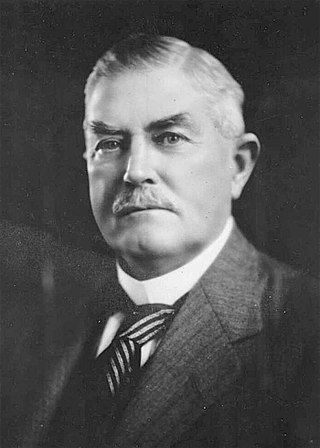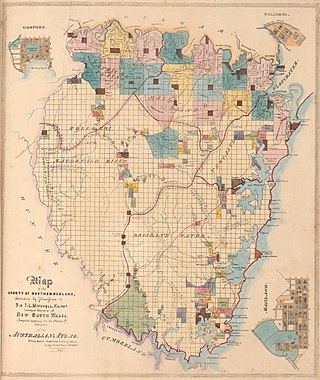Related Research Articles
Members of the New South Wales Legislative Assembly who served in the fourth parliament of New South Wales held their seats from 1860 to 1864: The Speaker was Terence Murray until 13 October 1862 and then John Hay.
Members of the New South Wales Legislative Assembly who served in the 11th parliament of New South Wales held their seats from 1882 to 1885. Elections for the eleventh Legislative Assembly were held between 30 November and 21 December 1882 with parliament first meeting on 3 January 1883. The Assembly was expanded to 113 members elected in 40 single member electorates, 26 two member electorates, 3 three member electorate and 3 four member electorates. The parliament had a maximum term of 3 years and was dissolved on 7 October 1885 after 33 months. The Premiers during this parliament were Sir Alexander Stuart until 7 October 1885 and then George Dibbs. The Speaker was Edmund Barton.
Thomas George Rusden was a squatter and politician in colonial New South Wales. He was a member of the Legislative Council between 1855 and 1856 and a member of the Legislative Assembly for one term between 1856 and 1857.

The Fuller ministry (1921) or First Fuller ministry was the 39th ministry of the New South Wales Government, and was led by the 22nd Premier, Sir George Fuller. The ministry covers just seven hours during 20 December 1921, the shortest of any ministry in the history of self-government in the state.
James Hart (1825–1873) was a politician in the New South Wales Legislative Assembly.
Benjamin Lee was an English-born Australian politician.

The Electoral district of County of Northumberland and from 1851, Northumberland and Hunter, was an electorate of the partially elected New South Wales Legislative Council, created for the first elections for the Council in 1843. The County of Northumberland was bounded by the part of the Hawkesbury River to the south, the Macdonald River to the south-west, and the Hunter River to the north, however the electoral district did not include the towns of East Maitland, West Maitland and Newcastle which made up the district of Northumberland Boroughs. Polling took place at Gosford, Newcastle, East Maitland, Wollombi, Singleton and Watson's on the Macdonald River. The County of Hunter was added to the district with the expansion of the Council in 1851 and elected two members.

The Electoral district of Northumberland Boroughs was an electorate of the partially elected New South Wales Legislative Council, created for the first elections for the Council in 1843. From 1843 until 1851 the electorate covered the major towns or boroughs of Northumberland County, East Maitland, West Maitland and Newcastle, and polling took place at East Maitland, West Maitland and Newcastle. Morpeth was added to the electorate from 1851 while Newcastle was removed from the electorate to form, with Raymond Terrace, the North Eastern Boroughs. The rest of Northumberland County was covered by the County of Northumberland from 1843 until 1951, and Counties of Northumberland and Hunter from 1851 until 1856.
The Electoral district of Pastoral Districts of New England and Macleay was an electorate of the New South Wales Legislative Council at a time when some of its members were elected and the balance were appointed by the Governor. It was a new electorate created in 1851 by the expansion of the Legislative Council to 54, 18 to be appointed and 36 elected. The district is located in the north of the state and covered the Northern Tablelands region of New England and part of the Mid North Coast region, including the area to the north of the Macleay River, but excluding the area south of the Macleay River which was included in the Counties of Gloucester and Macquarie. To the north was the Pastoral Districts of Clarence and Darling Downs and to the west the Pastoral Districts of Liverpool Plains and Gwydir. Polling took place in the towns of Wellingrove, Armidale, Tenterfield, Walcha and Kempsey.
A by-election was held for the New South Wales Legislative Assembly electorate of New England and Macleay on 26 November 1858 because of the resignation of Abram Moriarty, for reasons that included the difficulty of serving a far distant electorate.
A by-election was held for the New South Wales Legislative Assembly electorate of Parramatta on 10 April 1861 caused by the resignation of sitting member James Byrnes. At the election in December 1860 he gained second place behind a newcomer John Lackey. While still successful, Byrnes took offence at being placed second, stating that the majority of voters had decided that he was not fit to serve them and resigned in March 1861 without taking his seat.
A by-election was held for the New South Wales Legislative Assembly electorate of Goulburn on 13 June 1861 because of the resignation of Charles Walsh. Walsh stated that he had been elected to support the Land Bills, which would open up the free selection of Crown land, and the Legislative Council Bill which would replace the nominated council with an elected body. These bills had not been passed by the Legislative Council and the Premier Charles Cowper had arranged for 21 new members to be appointed to the council. Walsh stated that as the bills "will be carried through both branches of the legislature, and become the law of the land" he therefore resigned as the tasks had been achieved.
A by-election was held for the New South Wales Legislative Assembly electorate of Goldfields South on 12 December 1870 as a result of the Legislative Assembly declaring the election of Ezekiel Baker was void. Baker had been appointed to conduct a Royal Commission to inquire into the laws and regulations of the goldfields and for securing a permanent water supply. The Committee of Elections and Qualifications held that this appointment was an office of profit under the crown which meant he was incapable of being elected, or of sitting, or voting, as a member of the Assembly.
A by-election was held for the New South Wales Legislative Assembly electorate of Tenterfield on 24 August 1874 because Robert Abbott had been appointed Secretary for Mines in the first Parkes ministry. Such ministerial by-elections were usually uncontested.
A by-election was held for the New South Wales Legislative Assembly electorate of The Hunter on 5 August 1861 because Isidore Blake resigned to accept appointment as a judge of the District Court.
A by-election was held for the New South Wales Legislative Assembly electorate of Lower Hunter on 19 July 1861 because of the resignation of Alexander Scott to accept an appointment to the Legislative Council.
A by-election was held for the New South Wales Legislative Assembly electorate of New England on 10 January 1887 because of the resignation of William Proctor. He had been found guilty by a jury of having sat and voted in parliament whilst he had an interest in a contract with the Government and the statutory penalty of £500 was imposed. Proceedings were stayed pending Proctor's appeal to the Full Court of the Supreme Court, however he resigned stating that he desired to have the verdict of his constituents.
A by-election for the seat of Tenterfield in the New South Wales Legislative Assembly was held on 20 November 1884 because of the resignation of Sir Henry Parkes, stating that he was retiring from politics and that "I have no intention of seeking or accepting a seat in any future Parliament".
A by-election was held for the New South Wales Legislative Assembly electorate of Tenterfield on 6 February 1882 because of the resignation of John Dillon, to accept an appointment as senior stipendiary magistrate.
A by-election was held for the New South Wales Legislative Assembly electorate of Morpeth on 18 September 1862 because David Buchanan was insolvent and resigned his seat. Buchanan had unsuccessfully sued the Sydney Morning Herald for libel and was required to pay their legal costs. He was unable to pay and declared himself bankrupt.
References
- 1 2 "Mr Robert Meston". Former members of the Parliament of New South Wales . Retrieved 18 June 2021.
- ↑ "Legislative Assembly: Seat vacated". The Sydney Morning Herald . 6 November 1861. p. 3. Retrieved 18 June 2021– via Trove.
- ↑ "Writ of election: Tenterfield". New South Wales Government Gazette . No. 247. 6 November 1861. p. 2366. Retrieved 18 February 2021– via Trove.
- ↑ "Nomination for Tenterfield". The Maitland Mercury and Hunter River General Advertiser . 3 December 1861. p. 3. Retrieved 18 June 2021– via Trove.
- ↑ "Election for Tenterfield". The Armidale Express and New England General Advertiser . 14 December 1861. p. 2. Retrieved 18 June 2021– via Trove.
- ↑ Green, Antony. "1861 Tenterfield by-election". New South Wales Election Results 1856-2007. Parliament of New South Wales . Retrieved 28 November 2019.